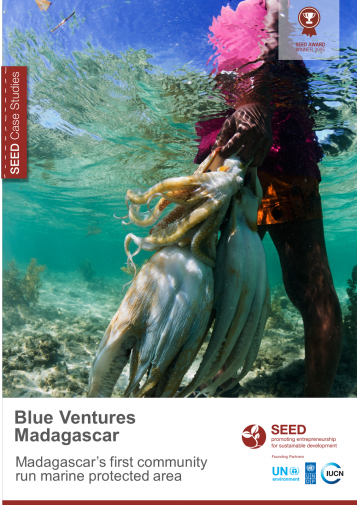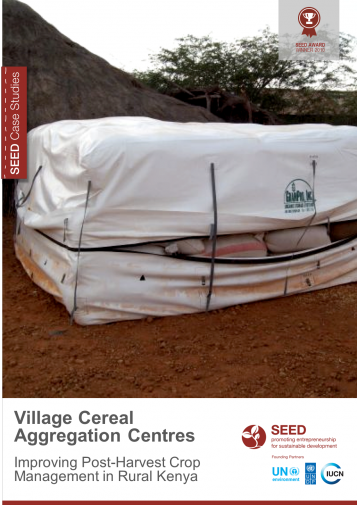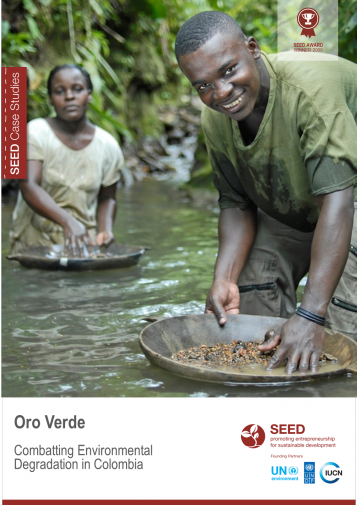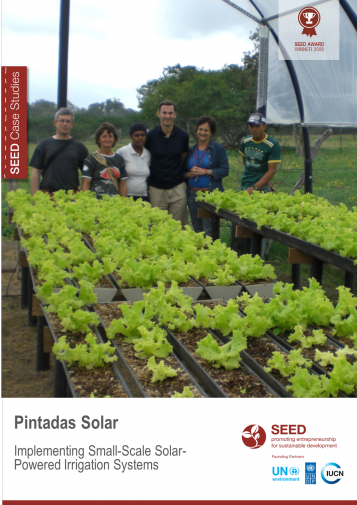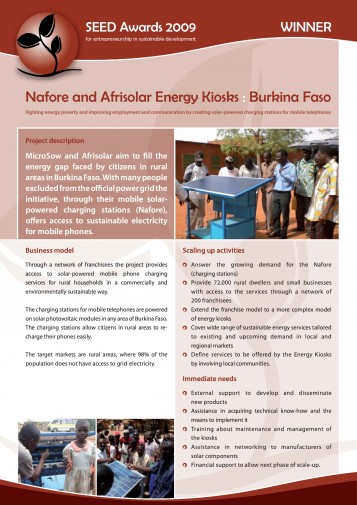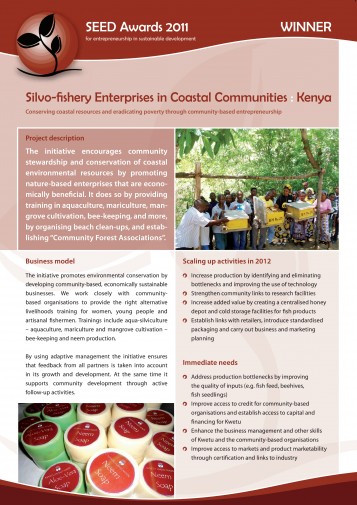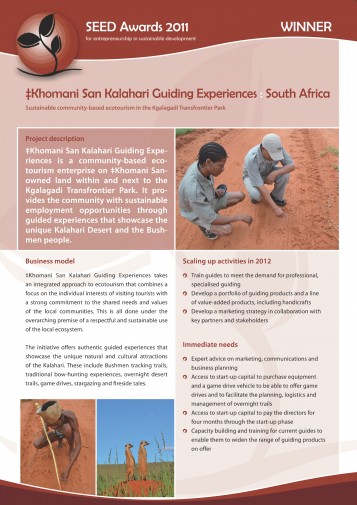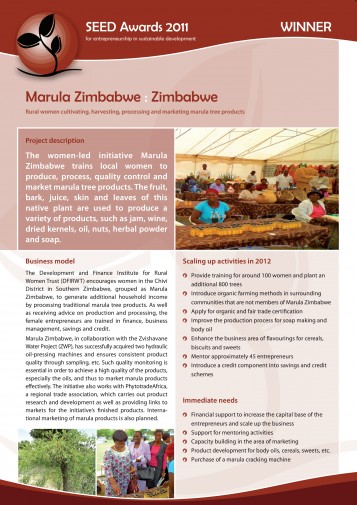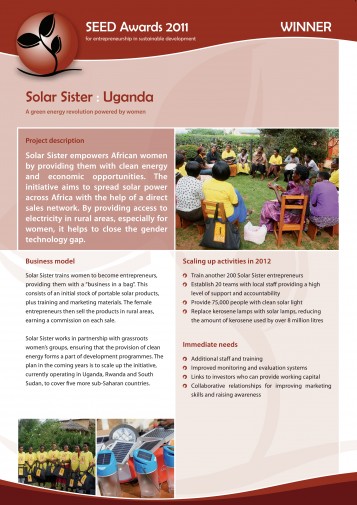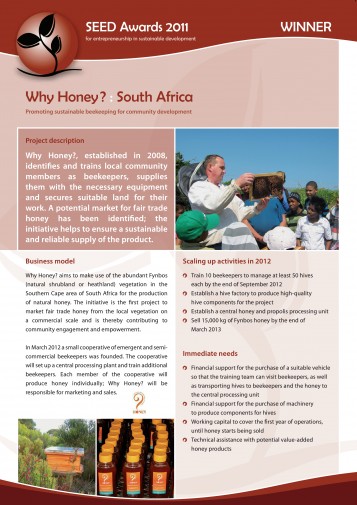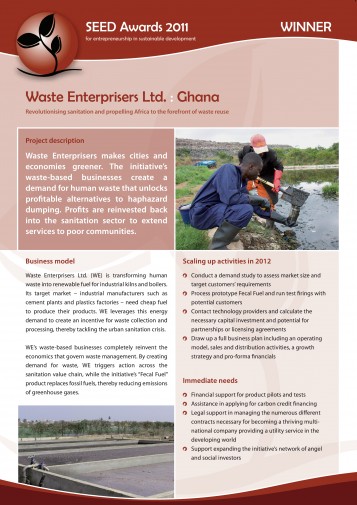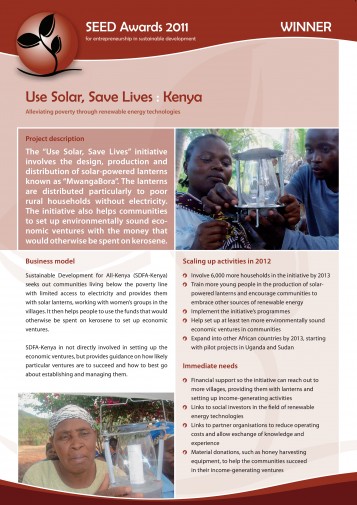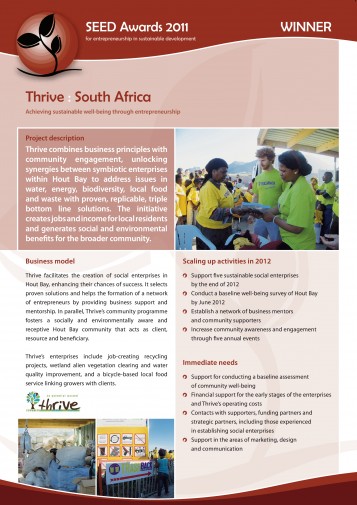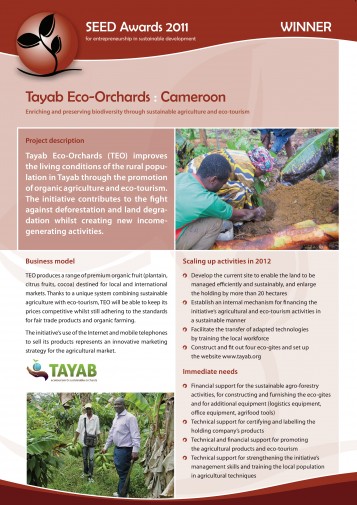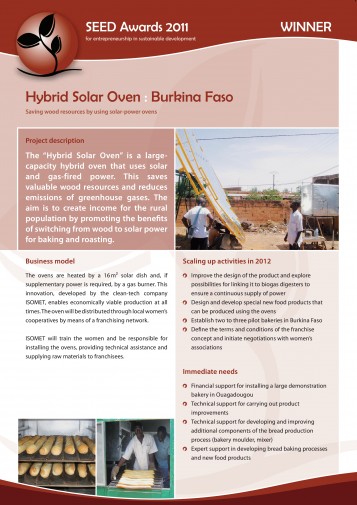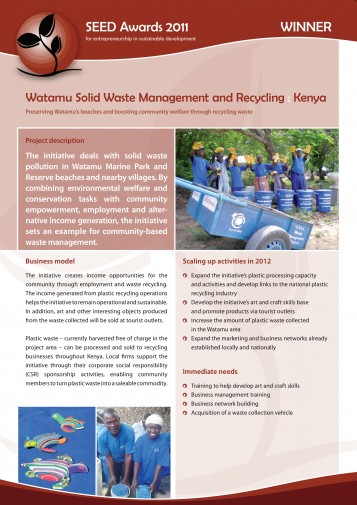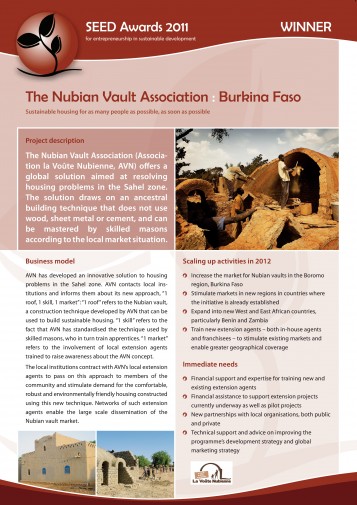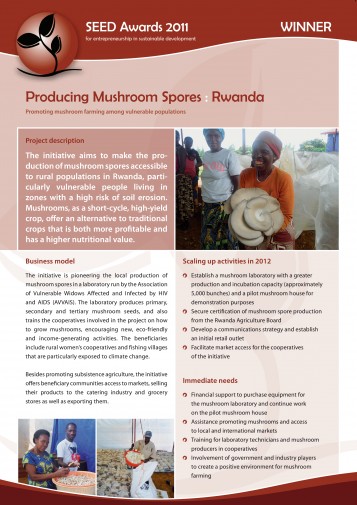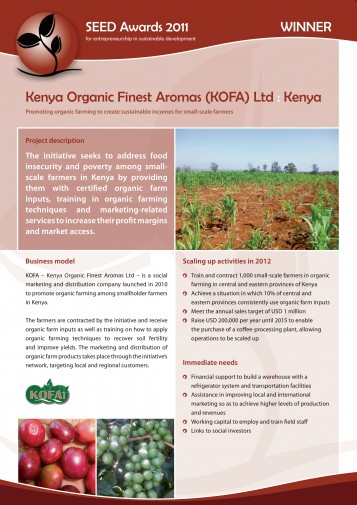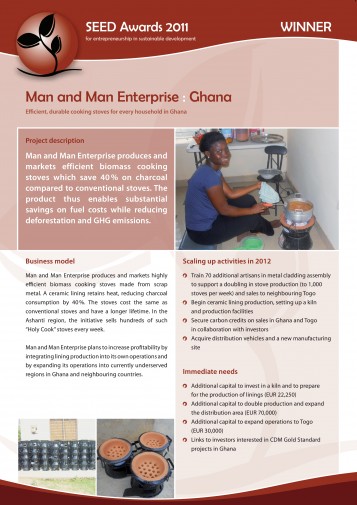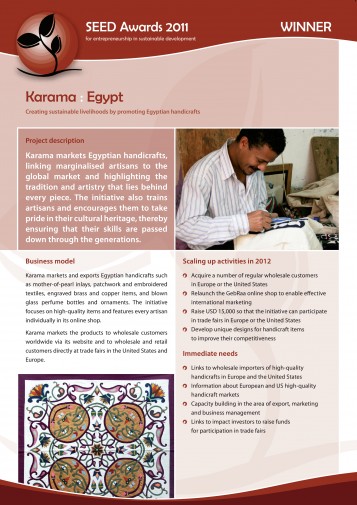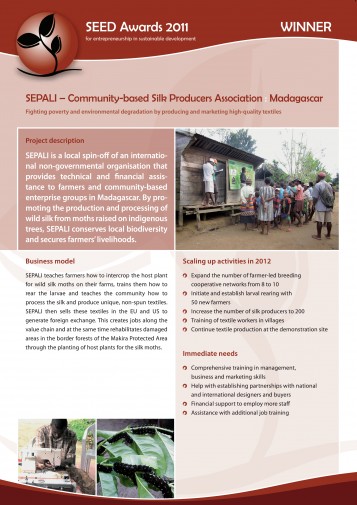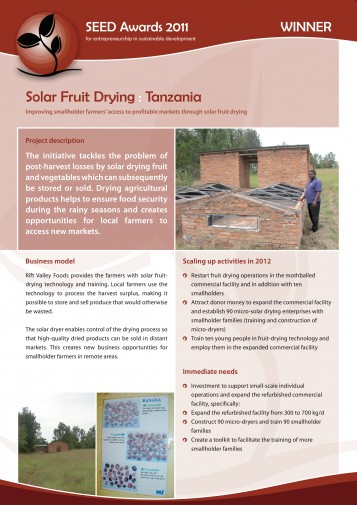Case Study: Blue Ventures
Published: 07 September 2012
“Madagascar’s first community-run marine protected area” is a partnership between local people, research institutes, NGOs and a commercial fishing company and focuses on marine conservation and sustainable livelihoods along the southwest coast of Madagascar. Read more
SDGs:









Case Study: Village Cereal Aggregation Centres
Published: 07 September 2012
This initiative enables farmers to deliver high-quality grain to the market value chain, reduce post-harvest losses, and encourage more participation of youth in cereal production. Read more
SDGs:







Case Study: Oro Verde
Published: 07 September 2012
Oro Verde reverses environmental degradation caused by uncontrolled mining in Colombia’s Chocó Bioregion by developing certified responsible mining practices. Read more
SDGs:











Case Study: Pintadas Solar
Published: 07 September 2012
Pintadas Solar creates sustainable and replicable models geared towards improving livelihoods and climate resilience in areas where agriculture and pasture is the main economic activity. Read more
SDGs:









Case Study: Nafore and Afrisolar Energy Kiosks
Published: 07 September 2012
The Nafore and AfriSolar Energy Kiosks were created to address rural electrification challenges in Burkina Faso. Read more
SDGs:







Enterprise Brief: Upscaling the siliviculture based enterprises of coastal communities in Kenya
Published: 30 August 2011
The initiative encourages community stewardship and conservation of coastal environmental resources by promoting nature-based enterprises that are economically beneficial. It does so by providing training in aquaculture, mariculture, mangrove cultivation, bee-keeping, and more, by organising beach clean-ups, and establishing “Community Forest Associations” Read more
SDGs:







Enterprise Brief: The Development of a Khomani San Cultural and Nature Guiding Enterprise and Association
Published: 30 August 2011
Khomani San Kalahari Guiding Experiences is a community-based eco-tourism enterprise on Khomani San-owned land within and next to the Kgalagadi Transfrontier Park. It provides the community with sustainable employment opportunities through guided experiences that showcase the unique Kalahari Desert and the Bushmen people. Read more
SDGs:







Enterprise Brief: Marula Zimbabwe
Published: 30 August 2011
The women-led initiative Marula Zimbabwe trains local women to produce, process, control the quality of, and market marula tree products. The fruit, bark, juice, skin, and leaves of this native plant are used to produce a variety of products, such as jam, wine, dried kernels, oil, nuts, herbal powder, and soap. Read more
SDGs:









Enterprise Brief: Solar Sister
Published: 30 August 2011
Solar Sister empowers African women by providing them with clean energy and economic opportunities. The initiative aims to spread solar power across Africa with the help of a direct sales network. By providing access to electricity in rural areas, especially for women, it helps to close the gender technology gap. Read more
SDGs:











Enterprise Brief: Why Honey
Published: 30 August 2011
Why Honey?, established in 2008, identifies and trains local community members as beekeepers, supplies them with the necessary equipment and secures suitable land for their work. A potential market for fair trade honey has been identified; the initiative helps to ensure a sustainable and reliable supply of the product. Read more
SDGs:









Enterprise Brief: Waste Enterprisers
Published: 30 August 2011
Waste Enterprisers makes cities and economies greener. The initiative’s waste-based businesses create a demand for human waste that unlocks profitable alternatives to haphazard dumping. Profits are reinvested back into the sanitation sector to extend services to poor communities. Read more
SDGs:







Enterprise Brief: Sustainable Development For All
Published: 30 August 2011
The “Use Solar, Save Lives” initiative involves the design, production and distribution of solar-powered lanterns known as “MwangaBora”. The lanterns are distributed particularly to poor rural households without electricity. The initiative also helps communities to set up environmentally sound economic ventures with the money that would otherwise be spent on kerosene. Read more
SDGs:









Enterprise Brief: Thrive
Published: 30 August 2011
Thrive combines business principles with community engagement, unlocking synergies between symbiotic enterprises within Hout Bay to address issues in water, energy, biodiversity, local food, and waste with proven, replicable, triple bottom line solutions. The initiative creates jobs and income for local residents and generates social and environmental benefits for the broader community. Read more
SDGs:









Enterprise Brief: AGRIPO
Published: 30 August 2011
Tayab Eco-Orchards (TEO) improves the living conditions of the rural population in Tayab through the promotion of organic agriculture and eco-tourism. The initiative contributes to the fight against deforestation and land degradation whilst creating new income generating activities. Read more
SDGs:





Enterprise Brief: Women Environment Preservation Committee (WEPCO)
Published: 30 August 2011
The initiative seeks to enhance environmental conservation while generating income from recycled household waste, mainly in Kathmandu Valley. Women are provided with business and waste management training and access to micro-credit loans, and are encouraged to form conservation groups across the country. Read more
SDGs:







Enterprise Brief: ISOMET Sarl
Published: 30 August 2011
The “Hybrid Solar Oven” is a large capacity hybrid oven that uses solar and gas-fired power. This saves valuable wood resources and reduces emissions of greenhouse gases. The aim is to create income for the rural population by promoting the benefits of switching from wood to solar power for baking and roasting. Read more
SDGs:









Enterprise Brief: Watamu Community Solid Waste Management and Recycling Enterprises
Published: 30 August 2011
The initiative deals with solid waste pollution in Watamu Marine Park and Reserve beaches and nearby villages. By combining environmental welfare and conservation tasks with community empowerment, employment and alternative income generation, the initiative sets an example for community-based waste management. Read more
SDGs:









Enterprise Brief: Nubian Vault Association
Published: 30 August 2011
The Nubian Vault Association (Association la Voûte Nubienne, AVN) offers a global solution aimed at resolving housing problems in the Sahel zone. The solution draws on an ancestral building technique that does not use wood, sheet metal or cement, and can be mastered by skilled masons according to the local market situation. Read more
SDGs:







Enterprise Brief: Project for Producing Edible Mushroom Spores
Published: 29 August 2011
The initiative aims to make the production of mushroom spores accessible to rural populations in Rwanda, particularly vulnerable people living in zones with a high risk of soil erosion. Mushrooms, as a short-cycle, high-yield crop, offer an alternative to traditional crops that is both more profitable and has a higher nutritional value. Read more
SDGs:









Enterprise Brief: Kenya Organic Finest Aromas Ltd (KOFA)
Published: 29 August 2011
The initiative seeks to address food insecurity and poverty among smallscale farmers in Kenya by providing them with certified organic farm inputs, training in organic farming techniques and marketing-related services to increase their profit margins and market access. Read more
SDGs:







Enterprise Brief: Man and Man Enterprise
Published: 29 August 2011
Man and Man Enterprise produces and markets efficient biomass cooking stoves which save 40 % on charcoal compared to conventional stoves. The product thus enables substantial savings on fuel costs while reducing deforestation and GHG emissions. Read more
SDGs:







Enterprise Brief: Karama
Published: 29 August 2011
Karama markets Egyptian handicrafts, linking marginalised artisans to the global market and highlighting the tradition and artistry that lies behind every piece. The initiative also trains artisans and encourages them to take pride in their cultural heritage, thereby ensuring that their skills are passed down through the generations. Read more
SDGs:









Enterprise Brief: GreenTech Company Ltd - fuel briquettes from groundnut shells combined with fuel efficient stoves
Published: 29 August 2011
Since July 2011, GreenTech produces high quality fuel briquettes from groundnutshells and promotes fuel efficient stoves for cooking and heating purposes in households, restaurants and industries. As the combined briquette/stove unit needs less fuel input than common cooking units, it reduces cooking costs, emissions and the exploitation of forests. The briquettes are pressed by a heavy duty machine, producing 800kg/h. The stoves are produced with recycled metal by local weldermen. Briquettes and stoves are available on stock. Read more
SDGs:







Enterprise Brief: SEPALI Madagascar
Published: 29 August 2011
SEPALI is a local spin-of of an international non-governmental organisation that provides technical and financial assistance to farmers and community-based enterprise groups in Madagascar. By promoting the production and processing of wild silk from moths raised on indigenous trees, SEPALI conserves local biodiversity and secures farmers’ livelihoods. Read more
SDGs:







Enterprise Brief: FADECO Trading Co. Ltd.
Published: 29 August 2011
The initiative tackles the problem of post-harvest losses by solar drying fruit and vegetables which can subsequently be stored or sold. Drying agricultural products helps to ensure food security during the rainy seasons and creates opportunities for local farmers to access new markets. Read more
SDGs:








